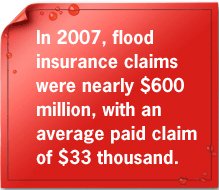Descriptions of the FEMA Flood Zones Located Around Your Home.
Understanding the FEMA Flood Zones is helpful in many ways.
If you live in such a flood zone then you may qualify for flood insurance for your home.
For those not living in a flood zone, there could be issues with getting any type of coverage for flood damage. Additionally, you may want to know if a home or property you are planning on buying is located in a flood zone. Knowing the extent of such rankings will allow you to see if the purchase is a good idea or if you should look to another area for a better deal.
Designations
FEMA flood zones are specific geographical locations that
 FEMA has defined according to the risk for flooding.
FEMA has defined according to the risk for flooding.
The zones are designated according to different historic and geographic information. The designation of each zone is available on a community's Flood Insurance Rate Map or Flood Hazard Boundary Map.
FEMA Flood Zones Descriptions
Each zone has its own characteristics. The designated zone and corresponding description of the zone will tell you about the likelihood of flooding and consequent damage to expect in that zone area.
The actual chart of zones can be difficult to understand since they are all written in factual, statistical terms and not layman's terms. The follow is a brief outline of zones put in simple terms to give you an idea of what the actual zone chart may look like.
Zone B,C and X: These are zones where there is a 1% chance of sheet flow flooding, stream flooding and flooding by levees. These zones are not required to purchase flood insurance.
Zone A, AE,A1-A30, AH, AO, A99: These zone areas have a 26% chance of experiencing flooding over a 30 year period.
Zone AR: this zone has a risk for damaging floods that pose a risk to structures due to the failing of a flood control system. Mandatory flood insurance is required for this zone.
Zone V, VE,V1-30: This is a coastal area with a 26% chance of flooding associated with storm waves over a 30 year period.
Zone D: This is a zone where no analysis of flooding possibilities has taken place and therefore it is impossible to determine the risk of flooding in the areas within this zone.
Insurance and Zones
As you can see by looking over the different zones, some areas will require mandatory flood insurance while others it may be an option. In some zones, flood insurance is not even available. If you live in a zone that has a great unlikelihood of flooding then chances are you are not eligible to purchase flood insurance.
Flood insurance availability and rates are all based upon the FEMA flood zones, so you should be able to get further information about the zones from your home owner’s insurance provider.
It is difficult to understand all the technical data associated with the flood zones. You do not have to understand every piece of information or even all zone classifications. In fact, you will only benefit from understanding the information associated with the specific zone in which you live or own property.
What to do after a flood?
- Stay away from flood waters. The water may be contaminated by oil, gasoline or raw sewage. The water may also be electrically charged from underground or downed power lines.
- Stay away from moving water. Moving water only six inches deep can sweep you off your feet.
- Be aware of areas where flood waters have receded. Roads may have weakened and could collapse under the weight of a car.
- Stay away from downed power lines and report them to the power company.
- Stay away from disaster areas unless authorities ask for volunteers.
- Continue listening to a battery-powered radio for information about where to get assistance for housing, clothing and food.
- Consider your family's health and safety needs. Wash your hands frequently with soap and clean water if you come in contact with flood waters. Throw away food that has come in contact with flood waters. Listen for news reports to learn whether the community's water supply is safe to drink.
- Contact your home insurance agent.
Ask your FEMA Flood Zone and Home Alarm Question HERE!
From FEMA Flood Zones to Home Alarms-to-Alert-You.com


